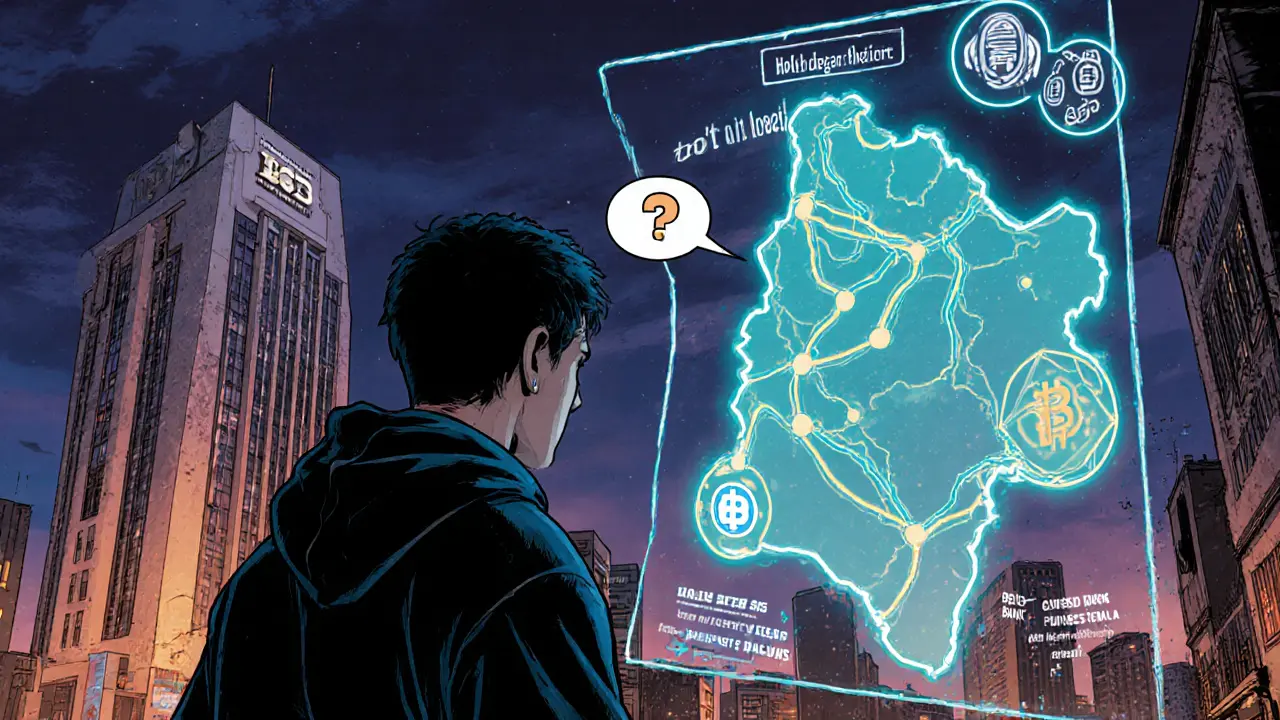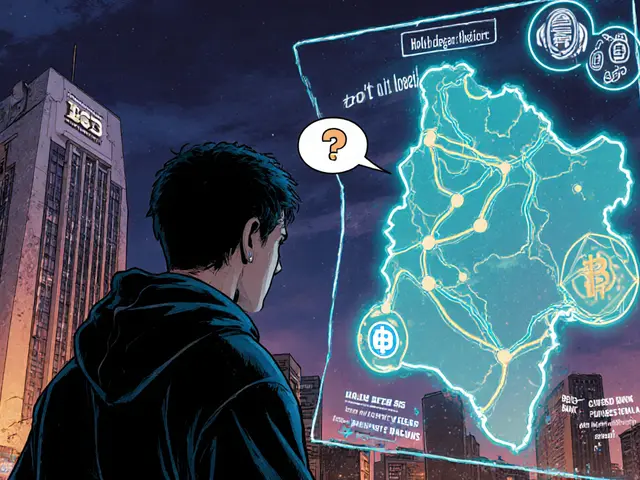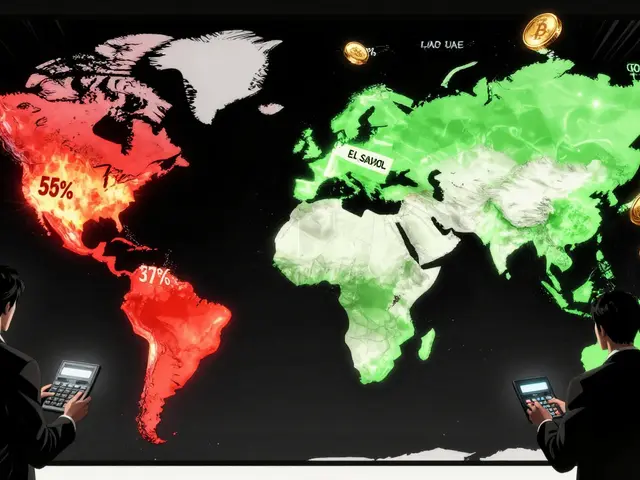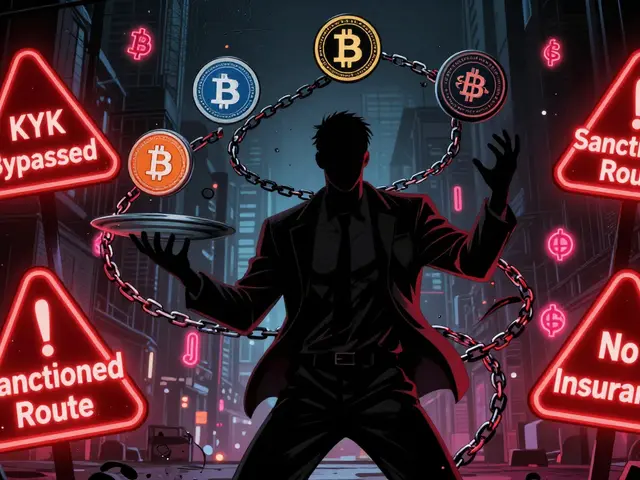- Home
- Cryptocurrency
- Bolivia Crypto Trading Penalties: What’s Legal in 2025

Bolivia Crypto Trading Penalties: What’s Legal in 2025
Bolivia Crypto Trading Penalty Calculator
Potential Penalty
Important Notes:
- Penalty amounts are determined on a case-by-case basis by regulators.
- Fines can range from 10 to 50 times the transaction value for unregistered exchanges.
- Non-compliance penalties accumulate quickly; daily fees apply for missed reporting.
- Severe violations may trigger criminal investigations and license revocations.
Since June 2024 Bolivia moved from a total ban on crypto to a tightly regulated market. If you’re buying, selling, or using digital assets, you need to know which actions are allowed and what the government will do if you step outside the rules. Below you’ll find a practical guide that answers the most common questions about legal penalties, tax duties, and compliance steps for crypto traders in Bolivia.
Quick Summary
- Crypto trading is legal only through licensed banks or authorized electronic‑payment channels.
- Off‑exchange transfers or using unregistered exchanges can trigger enforcement actions; penalties are decided case‑by‑case.
- Individuals face no capital‑gains tax, but businesses (mining, staking, crypto‑related services) pay a 25% corporate income tax.
- Daily transaction reports to the Central Bank of Bolivia (BCB) and cross‑checks against sanctions lists are mandatory.
- Compliance checklist: register with BCB/ASFI, use only licensed channels, keep detailed records, and report to tax authorities.
Legal Landscape Evolution
Bolivia introduced a full cryptocurrency ban in 2014 via the Central Bank of Bolivia (BCB). The ban aimed to protect the boliviano and avoid financial instability. Over the next decade, regulators rarely disclosed specific fine amounts, but the prohibition limited crypto activity to a shadow market.
In June 2024, the BCB issued Board Resolution N°082/2024, repealing the ban and creating a new framework that permits crypto transactions only through Electronic Payment Instruments (EPI). The change sparked a 630% surge in crypto volumes, jumping from $46.5million in early 2024 to $294million by mid‑2025.
Current Regulatory Framework
The 2025 regime rests on three bodies:
- Central Bank of Bolivia (BCB) - primary regulator, oversees licensing and daily reporting.
- Financial System Supervisory Authority (ASFI) - supervises financial institutions and enforces compliance.
- Financial Investigations Unit (FIU) - monitors illicit flows and sanctions compliance.
Key rules:
- All crypto transactions must flow through a licensed bank or an authorized EPI platform.
- Stablecoins (e.g., USDT, USDC) can be used for payroll or invoice settlement, but only via those licensed channels.
- The boliviano remains the sole legal tender; crypto cannot be used for ordinary business payments outside the authorized framework.
- Exchanges and service providers must register with BCB and ASFI before operating.

Penalties for Non‑Compliance
While the law no longer criminalizes ownership, it penalizes attempts to bypass the regulated system. Enforcement actions are assessed case‑by‑case, but common outcomes include:
| Violation | Possible Sanction | Notes |
|---|---|---|
| Using an unregistered exchange | Administrative fine (amount determined by regulator) + forced cessation of activity | Fine can range from 10 to 50times the illegal transaction value. |
| Transferring crypto off‑exchange without bank involvement | Suspension of banking privileges, possible criminal investigation | Authorities may freeze related accounts pending investigation. |
| Failure to report daily transactions | Daily non‑compliance penalty of 0.5% of transaction volume | Accumulates quickly; can lead to license revocation. |
| Violation of international sanctions list | Heavy fine (up to 100% of transaction value) + blacklist | FIU conducts thorough vetting; penalties are severe. |
| Unlicensed crypto‑related business (mining, staking) | Corporate income tax evasion fine of 30% of profit + possible imprisonment for fraud | Business must register and pay 25% CIT; evasion triggers harsher penalties. |
Because the exact fine amounts are not publicly listed, regulators retain flexibility to scale penalties based on the seriousness of the breach and the amounts involved.
Tax Implications
Bolivia does not levy a specific capital‑gains tax on individuals trading crypto. This makes personal speculation tax‑friendly. However, any profit generated by a legal entity - such as a mining operation, a staking service, or a crypto‑exchange - is subject to the standard Corporate Income Tax (CIT) at a rate of 25%.
Key tax compliance points:
- Maintain a ledger of every crypto transaction, including date, amount (in USD and bolivianos), and counterparties.
- Report crypto‑related revenue on the annual corporate tax filing.
- Pay the 25% CIT on net profit after deducting operational expenses.
- Individuals must still declare crypto‑related income if they receive it as salary or service payment; it is treated as regular taxable income.
Compliance Checklist for Traders and Businesses
- Register your exchange or crypto service with the BCB and obtain ASFI approval.
- Use only licensed banks or authorized EPI platforms for every transaction.
- Upload daily transaction logs to the BCB portal; include transaction IDs, counterparties, and amounts.
- Cross‑check all counterparties against international sanctions lists (FIU provides the database).
- Keep detailed records for at least five years for tax and audit purposes.
- If you run a crypto‑related business, file corporate tax returns and pay the 25% CIT on net earnings.
- Stay updated on regulatory notices; the BCB publishes quarterly guidance on permissible activities.
Enforcement & Monitoring Mechanisms
The BCB has built a real‑time monitoring system that ingests daily transaction feeds from all licensed banks. The system automatically flags:
- Transactions above $50,000 (USD) without a clear business purpose.
- Transfers to or from wallets on sanctioned jurisdictions.
- Patterns that resemble layering or rapid turnover (possible money‑laundering).
When a flag is raised, the FIU launches a case, and the ASFI may suspend the involved institution’s license until the issue is resolved. Public awareness campaigns have also been rolled out to help citizens recognize scams and understand the legal pathways for crypto use.

Frequently Asked Questions
Is buying Bitcoin illegal in Bolivia?
No. You can buy Bitcoin, but the purchase must be executed through a licensed bank or an authorized electronic‑payment platform. Direct peer‑to‑peer trades that avoid those channels are considered non‑compliant and can trigger enforcement.
What happens if I use an offshore exchange?
Using an unregistered offshore exchange is a violation. The regulator may impose a fine up to 50times the transaction value, freeze your local bank accounts, and initiate a criminal investigation for possible money‑laundering.
Do I need to pay tax on my crypto profits?
Individuals do not face a specific capital‑gains tax. However, if you receive crypto as salary, as payment for services, or run a crypto‑related business, that income is taxable like any other and must be reported.
Can I pay my rent with USDT?
Yes, but only through a licensed bank that offers USDT custody services (e.g., BancoBisa). The payment must be recorded and the bank must report the transaction to the BCB.
What is the biggest risk for crypto traders in Bolivia?
The biggest risk is using an unauthorized channel. The regulator’s monitoring system catches off‑exchange transfers quickly, leading to fines or license suspensions.
Cormac Riverton
I'm a blockchain analyst and private investor specializing in cryptocurrencies and equity markets. I research tokenomics, on-chain data, and market microstructure, and advise startups on exchange listings. I also write practical explainers and strategy notes for retail traders and fund teams. My work blends quantitative analysis with clear storytelling to make complex systems understandable.
Popular Articles
20 Comments
Write a comment Cancel reply
About
DEX Maniac is your hub for blockchain knowledge, cryptocurrencies, and global markets. Explore guides on crypto coins, DeFi, and decentralized exchanges with clear, actionable insights. Compare crypto exchanges, track airdrop opportunities, and follow timely market analysis across crypto and stocks. Stay informed with curated news, tools, and insights for smarter decisions.








So let me get this straight - you can trade crypto but only if a bank says so? That’s not regulation that’s digital feudalism. Who’s gonna audit the auditors? The same people who banned Bitcoin in 2014 and now act like they invented blockchain?
Lmao they’re taxing mining at 25% but not personal gains? So you’re fine if you HODL but if you try to make a business outta it? Pay up. Classic. 💸
This is actually kind of cool - Bolivia’s trying to bring crypto into the light without letting it run wild. Most countries either ban it or ignore it. This is a middle path. Respect to the regulators for trying something new.
You think this is strict? Wait till you see the next update. They’ll start requiring fingerprints for wallet access. India already does this for UPI. Why not Bolivia? 🇮🇳
I read this whole thing and my brain just said ‘meh’. Why does everyone act like this is groundbreaking? It’s just another government trying to control money. We’ve seen this movie before.
wait so if i buy btc through bank i need to report every day? what if i just hold? do i still need to send logs? im confused lol
If you’re just holding and not transacting daily, you’re probably fine. The reporting kicks in when you’re moving money through the system. But keep your records anyway - better safe than audited.
Bro this is actually a win for developing economies! Imagine a country with hyperinflation risks saying ‘hey we see crypto, we’re not scared, we’re gonna channel it’. Bolivia’s doing something bold. 🙌
They let crypto in but only if it’s filtered through state-approved banks? That’s not freedom. That’s surveillance with a smile. This isn’t progress - it’s control with a blockchain label.
Bolivia is showing the world that regulation doesn’t mean repression 😊✨ Imagine if more countries followed this model - safe, transparent, and still innovative! 🇧🇴💎
The real win here is the daily reporting system. Most countries don’t even track this stuff. Bolivia’s building infrastructure for the future. This isn’t about control - it’s about inclusion.
I’m Nigerian and I’ve seen this play out - governments fear what they don’t understand. But Bolivia’s trying to *use* crypto instead of just banning it. That’s leadership. I’m impressed.
so if i send usdt to my friend in la paz via p2p... is that illegal? or only if the bank notices? i just wanna send money to my cousin 😅
It’s funny how we assume all regulation is bad. Sometimes it’s just the system trying to catch up with tech that moved faster than laws. Bolivia’s not perfect - but they’re trying to build a bridge, not a wall.
25% tax on mining? Bro that’s high but fair if you’re running a biz. But for normal people? Free to HODL. I like it. No cap gain tax = more freedom. 🚀
They’re calling this freedom but it’s still a cage. You can’t even move crypto without a bank’s permission. That’s not innovation. That’s digital apartheid
You think you’re safe if you use a licensed bank? The BCB tracks every move. Your wallet is now a bank account with extra steps. Welcome to the surveillance economy.
I appreciate the clarity. The checklist is actually useful. Most crypto guides are full of hype. This one sticks to facts. Good job.
The enforcement mechanisms described are remarkably sophisticated for a developing economy. Real-time monitoring of transaction patterns suggests a serious commitment to financial integrity.
It is imperative to note that the regulatory framework outlined herein constitutes a paradigmatic shift in the Bolivian financial ecosystem. The integration of EPIs into the monetary infrastructure represents a non-trivial evolution in central banking policy.